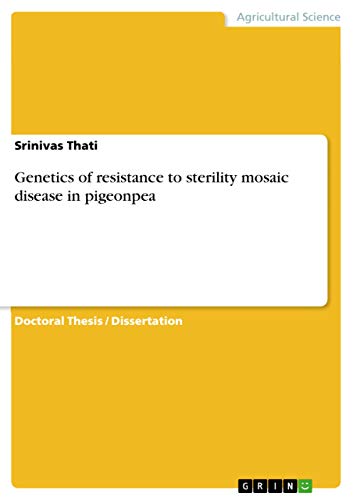Items related to Genetics of resistance to sterility mosaic disease...

"synopsis" may belong to another edition of this title.
"About this title" may belong to another edition of this title.
- PublisherGRIN Verlag
- Publication date2015
- ISBN 10 3668057516
- ISBN 13 9783668057517
- BindingPaperback
- Number of pages126
Buy New
Learn more about this copy
Shipping:
£ 19.63
From Germany to U.S.A.
Top Search Results from the AbeBooks Marketplace
Genetics of resistance to sterility mosaic disease in pigeonpea
Book Description Taschenbuch. Condition: Neu. This item is printed on demand - it takes 3-4 days longer - Neuware -Doctoral Thesis / Dissertation from the year 1996 in the subject Agrarian Studies, Andhra University (Andhra Pradesh Agricultural University), course: Ph.D, language: English, abstract: Investigations on genetics of resistance to sterility mosaic (SM) disease in pigeonpea were carried out (1993-96) at ICRISAT Asia Center, Patancheru, India, to determine the inheritance of resistance for three different isolates of pigeonpea sterility mosaic pathogen and to study the combining ability of few resistant and tolerant lines.In this direction, available lines (resistant/tolerant) were screened against two isolates of the SM pathogen. Breakdown of resistance was noticed in several lines, against isolate 2 of the pathogen. However, few lines resistant and tolerant to both the isolates were identified.Inheritance of resistance and tolerance, in few of these lines was investigated. Screening was carried out in pots, using leaf-stapling technique for isolates 1 and 3 and infector-hedge, for isolate 2. Observations in F, and segregating generations indicated the recessive nature of resistance and role of two independent non-allelic genes for isolates 1 and 3. Resistance against these isolates appeared to be dependent on the presence of recessive alleles, at least at one of the loci. However, against isolate 2, resistance was observed recessive in some crosses and dominant in other crosses. Further, disease reaction for isolate 2, appeared to be governed by two independent non-allelic genes, with at least three multiple alleles, at one of the loci.Combining ability studies of the resistant, tolerant and susceptible lines, included in the inheritance studies, were carried out with line x tester mating design, involving two male steriles and eleven pollen parents. The analysis of variance revealed significant differences for parents, hybrids, parents vs. hybrids and males, for all characters studied. Pre-ponderance of non-additive gene action was recorded for yield and all yield component characters studied.ICP MS288 female was found to be a good combiner for early maturity, dwarf and compact growth habit while ICP MS3783 tolerant to isolate 1 of pigeonpea sterility mosaic pathogen and wilt disease was better combiner for seed yield, pods per plant, test weight, primary and secondary branches. Among the males, LRG 30 recorded high general combining ability, for seed yield and majority of yield components. The sterility mosaic resistant parents were however, poor combiners for yield and majority of the component characters. 124 pp. Englisch. Seller Inventory # 9783668057517
Genetics of resistance to sterility mosaic disease in pigeonpea
Book Description Taschenbuch. Condition: Neu. Druck auf Anfrage Neuware - Printed after ordering - Doctoral Thesis / Dissertation from the year 1996 in the subject Agrarian Studies, Andhra University (Andhra Pradesh Agricultural University), course: Ph.D, language: English, abstract: Investigations on genetics of resistance to sterility mosaic (SM) disease in pigeonpea were carried out (1993-96) at ICRISAT Asia Center, Patancheru, India, to determine the inheritance of resistance for three different isolates of pigeonpea sterility mosaic pathogen and to study the combining ability of few resistant and tolerant lines.In this direction, available lines (resistant/tolerant) were screened against two isolates of the SM pathogen. Breakdown of resistance was noticed in several lines, against isolate 2 of the pathogen. However, few lines resistant and tolerant to both the isolates were identified.Inheritance of resistance and tolerance, in few of these lines was investigated. Screening was carried out in pots, using leaf-stapling technique for isolates 1 and 3 and infector-hedge, for isolate 2. Observations in F, and segregating generations indicated the recessive nature of resistance and role of two independent non-allelic genes for isolates 1 and 3. Resistance against these isolates appeared to be dependent on the presence of recessive alleles, at least at one of the loci. However, against isolate 2, resistance was observed recessive in some crosses and dominant in other crosses. Further, disease reaction for isolate 2, appeared to be governed by two independent non-allelic genes, with at least three multiple alleles, at one of the loci.Combining ability studies of the resistant, tolerant and susceptible lines, included in the inheritance studies, were carried out with line x tester mating design, involving two male steriles and eleven pollen parents. The analysis of variance revealed significant differences for parents, hybrids, parents vs. hybrids and males, for all characters studied. Pre-ponderance of non-additive gene action was recorded for yield and all yield component characters studied.ICP MS288 female was found to be a good combiner for early maturity, dwarf and compact growth habit while ICP MS3783 tolerant to isolate 1 of pigeonpea sterility mosaic pathogen and wilt disease was better combiner for seed yield, pods per plant, test weight, primary and secondary branches. Among the males, LRG 30 recorded high general combining ability, for seed yield and majority of yield components. The sterility mosaic resistant parents were however, poor combiners for yield and majority of the component characters. Seller Inventory # 9783668057517

